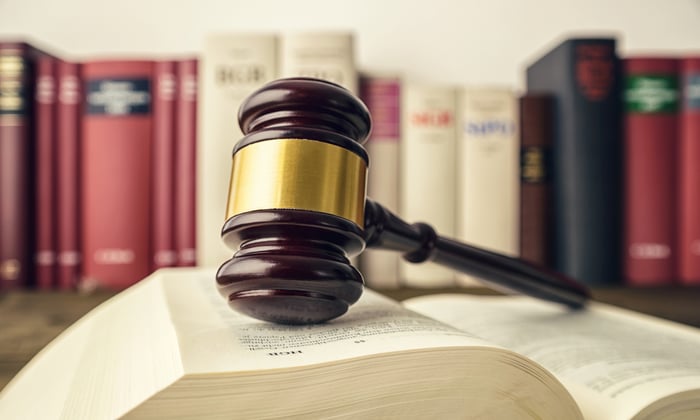While the Robinhood stock-investing app has been around since 2015, it really only hit its stride in 2020. The onset of the coronavirus-induced stock market slump -- which saw the major indexes shed about one-third of their value -- piqued the interest of many novice investors.
Robinhood's easy-to-use interface, no-fee trading options, and the offer of one free share of stock to those who open an account were effective enticements to fledgling investors. Roughly 6 million online investment accounts were opened during the first six months of 2020, and at least half of those were Robinhood accounts, according to a report by Barron's.
Unfortunately, this group of mostly inexperienced investors has gained a reputation for making risky (if not downright dangerous) stock trades. Let's look at two stocks that Robinhood investors would do well to avoid as if their financial health depended on it -- because it just might.

Image source: Getty Images.
1. Nikola: Shocking developments
Robinhood investors were no doubt intrigued by the recent success of Tesla (TSLA 12.06%), as the electric vehicle (EV) pioneer has had a year worthy of the record books. After generating its fourth quarter of consecutive profits and initiating a much-publicized stock split, Tesla stock hit a record high, sending Robinhood investors searching for the next big thing.
Many decided they had found it in Nikola (NKLA -2.41%), an up-and-comer in the EV ranks. The company developed the Badger EV, a series of electric semitrailer trucks, and was also working on electric/hydrogen fuel cell hybrid technology. General Motors (GM -0.04%) recently announced it would take a $2 billion stake in the company, as well build its flagship Badger, and be the exclusive supplier of its fuel cells for most markets.
The stock seemed unstoppable, this is until the wheels came off. A report issued earlier this month by noted short-seller Hindenburg Research started the slow-motion car wreck. The report accused Nikola founder Trevor Milton of making "dozens of false statements" and exaggerating the extent of Nikola's proprietary technology. Within days, other reports revealed that the Securities and Exchange Commission (SEC) and the U.S. Department of Justice (DOJ) were investigating allegations that the company misled investors.
After initially denying the allegations and calling it a "hit job," Milton tweeted that he couldn't comment on the advice of counsel. On Monday, the other shoe dropped and Milton resigned as executive chairman. It's important to note that while both Milton and Nikola have denied the allegations, the stock has crumbled under the weight of the assertions, losing nearly a third of its value.
Taking matters from bad to worse, the company has yet to bring a single vehicle to market and continues to lose money hand over fist. In the second quarter that amounted to a loss of $87 million, worse by 403% from a loss of $17 million in the prior-year quarter.
With investigations proceeding from both the SEC and the DOJ, Robinhood investors shouldn't touch Nikola stock with a 10-foot pole.

Image source: Getty Images.
2. Eastman Kodak: Not picture perfect
While older investors will associate the name Eastman Kodak (KODK -1.93%) with cameras and film, the photography innovator missed the move to digital and had to find a new line of work. The company's been struggling financially for years in the commercial printing business, but has recently pivoted to technology and -- in the wake of the coronavirus -- pharmaceuticals. It's Kodak's latest endeavor that captured the imagination of Robinhood investors, but could also be the company's undoing.
The company revealed in late July that it qualified for a $765 million U.S. government loan to produce critical pharmaceutical components to help jump-start drug production related to COVID-19. This news initially sent its stock soaring as much as 1,900% in the days that followed. That was also when the problems started.
A report revealed that Kodak had awarded its top executives potentially lucrative stock options just prior to publicly releasing the information about its government contract win. Management's windfall was cut short when the government subsequently put the loan on hold and launched an investigation by the SEC to determine if the company engaged in insider trading.
A law firm hired by Kodak to perform an independent investigation cleared the company of any wrongdoing, but the SEC has yet to release its findings.
Even worse are Kodak's legacy business operations, which are troubling to say the least. For the second quarter, revenue of $213 million fell 31% year over year, while its loss from operations of $5 million was roughly equivalent to the prior-year quarter. While management cites the coronavirus as the culprit, this downward trend has been ongoing for several years.
Despite fledgling investors' optimism, even if the company is eventually cleared of wrongdoing, Kodak is clearly on life support and should be avoided at all costs.

Image source: Getty Images.
A common thread
Astute investors will have noticed that these two companies share something in common: trouble with the SEC. I don't have many investing rules that are etched in granite. However, once the SEC gets involved, it's a big red flag for me.
It's possible that either or both of these companies could be completely vindicated. On the other hand, with so many quality stocks out there, why take the chance?

